- Home
- Michael Buckley
Undertow Page 17
Undertow Read online
Page 17
“No!” I cry.
Fathom extends the blades in his arms and leaps back into the air, bringing his jagged saws across the chest of his opponent. The skin divides, exposing pink flesh, and a waterfall of blood pours down his abdomen. The crowd cheers as the Selkie presses his hands to the wound. He’s clearly surprised as he watches his life pour out between his fingers, but instead of crying out or asking for help, he lets out an uproarious laugh. He drops his sword and kneels to the boy. He barks a few things at him, but not in anger. He’s smiling and cheering Fathom, celebrating his own loss.
Fathom’s blades retract and the crowd cheers, all except his family. His father and stepmother boo. The only one on Fathom’s side is the bald Triton with the goatee who stands behind them. My mother told me the prime has a brother. He must be Fathom’s uncle.
Terrance pushes through the crowd and approaches. His presence causes an angry uproar everywhere he goes. Alpha push and shove him, shout angry words, and spit at him. He keeps his head down and continues his approach, even when a Selkie kicks him in the behind.
“You got one seriously screwed-up way of life, Lir,” Foster says to him.
Terrance ignores him. He shoots my father and me a look but quickly turns his gaze to the ground. “His Majesty sends his appreciation for you coming to the camp, Ms. Walker. He will meet you at the end of the pier. Please come alone.”
“I’m not leaving her with that kid,” my father says. “He just nearly cut a man in half.”
“He won’t harm her, Mr. Walker. But he will not be watched, either. The Alpha camp is not for spying humans,” Terrance says.
“Spying humans? Ouch,” I say as my father and I are led to the pier.
“At least he’s playing along,” my father replies.
There are not a lot of places to sit at the end of the pier. Without anyone to clean it up, it’s become a bathroom for seagulls and pigeons. Birds are sort of disgusting. Not only do they empty their bowels all over the place, they use it as a dinner table too. There are thousands of crab shells up here, scooped up, tossed onto the planks, and then devoured. I can’t take a step without hearing a crunch.
I kick some aside and lean against the railing, then think better of it. If no one’s cleaning it, no one is maintaining it either. The whole thing might collapse under my weight for all I know. Why does Fathom want to meet here?
I wait for ten minutes, watching my father pace back and forth on the beach. I wonder where Fathom is, if he’s pulling the “I’m royalty” card, which he believes entitles him to be rude. Then again, he might have bled to death after the fight.
Suddenly, I hear a splash below, but before I can investigate I watch Fathom shoot into the air, a rocket with a trail of ocean water behind him. He soars high above the pier, three stories above the water below, and then comes down a few feet from me, where he lands as nimble as a cat. He’s still wearing his armor and is glistening wet.
“Hello, Lyric Walker.”
“Oh” is all I can think to say.
He kicks some shells from beneath his bare feet and turns to me, his armor clinking against itself with every twitch of his muscles.
“I’m sorry I am late. Those who fall before me in battle are entitled to make amends.”
“So he apologized for beating you up?” I ask.
He shakes his head. “He apologized for believing he could.”
“Are you ever scared?”
He looks at me for a long time, as if I’m talking gibberish and he’s too polite to ask me to repeat myself.
“I know, I know. The Triton aren’t afraid of anything. But down deep, aren’t you ever worried that one day one of your subjects is going to get the best of you?”
He shakes his head.
I shake mine, too, in frustration, then gesture toward the shore. “Just do me a favor. When you’ve got open wounds, can you not go swimming? That brown muck you call an ocean has been a toilet for drunks and toddlers for two hundred years.”
He dismisses my medical advice. “Did you bring books?”
“Fine, but if you’re dead by the weekend, don’t blame me,” I say, and open my bag. I brought Alexander and the Terrible, Horrible, No Good, Very Bad Day; The Very Hungry Caterpillar; Each Peach Pear Plum; and The Giant Jam Sandwich. He snatches them and quickly flips through the pages. I step closer and notice his finger is pointing to a word.
“This is the word the—correct?”
I’m amazed. “You learned a sight word!”
He tries to stay stony faced, but I can see the spark of pride in his eyes. He flips through and finds another. “This is and?”
I laugh and throw my hand up for a high-five. He leaves me hanging.
“You’re picking it up very quickly,” I say.
“You are a good teacher, Lyric Walker, like a Daughter of Ceto.”
“That’s not what you said the other day.”
“I said a few things I did not mean the other day,” he says. “And I let you leave before I could correct something I led you to believe.”
“What’s that?”
“I do not find you disgusting,” he says. He looks away, but I’m sure I saw a little pink in his cheeks.
“Good, because I can’t be friends with people who think I’m disgusting. It’s kind of a rule,” I say.
“Friends,” he says slowly, as if he’s trying the word out before committing to it. “It appears that Doyle has gotten his way.”
“I guess, but there’s no way in the world I’ll admit it to him.”
He nods. “Our secret.”
We read the books, and I try to explain to him what jam is, and why human children are not thrown into the Great Abyss for being grouchy and disrespectful to their parents. Alexander would never make it as an Alpha. Fathom confuses a caterpillar for a shark, which according to him is just as ravenous.
When the hour is up, my father and Foster march down the pier to retrieve me.
“I don’t find our meetings as distasteful as I once did,” Fathom says while we still have some privacy.
“When I finish teaching you to read, I think I’m going to teach you how to talk to a girl,” I say, but inside I’m fighting back a smile.
He studies me, perplexed, then suddenly loses a battle with a smile of his own. I’ve never been shocked by one, but there aren’t any smiles like his. It’s so unexpected, like a comet streaking across the sky. Before I can fully process it, he leaps over the railing and down into the water.
“I hate when you do that,” I shout at him, but I’m glad he did it, because an ache was coming over me to stretch on tippy-toes and taste that smile.
“Are you okay?” my father asks me when he reaches the end of the pier.
I nod without turning to him. I would die if he saw the goofy grin on my face, so I stare down into the waves. But someone sees me. Arcade is below, treading water and scowling.
Chapter Eighteen
I meet with Fathom every afternoon. Each day, my arrival in the camp causes a stir. Alpha children wait at the gate to watch me. They whisper to one another, sharing stories that sometimes make them laugh and sometimes cause them to run off in terror. Two Selkie women follow me wherever Fathom and I go. He tells me they report to the prime.
“My stepmother has convinced my father that you are a bad influence on me,” he says.
I laugh, but the idea that the leaders of his community are discussing me at all gives me the willies.
Arcade watches me too. Sometimes I catch her lurking around corners; other times I think she wants me to see her. Every day, while Fathom and I read, she waits for him at the end of the pier. A tall, handsome Triton sits with her, laughing and teasing her. Fathom tells me his name is Flyer.
“My cousin loves to torment her,” Fathom explains.
“Wait! He’s your cousin?” I cry.
“Yes. You look surprised,” he says.
“I guess I am,” I confess. “He’s not as—”
&nbs
p; “Yes?”
I run through ways to describe him: stiff, serious, stubborn. “Responsible,” I say.
Fathom nods, but he stares at me like he knows what I was thinking.
“What does he tease her about?” I say, eager to change the subject.
“You.”
I blush and turn my attention to them. I don’t think she enjoys Flyer’s jokes. Some days she stomps away from him, barking angrily while he roars with amusement. She’s jealous, which makes me feel guilty.
“It’s time to go,” Fathom says, helping me to my feet. Together we walk down the ramp toward the beach. She’s there, waiting, flashing me her all-knowing look. I’m tempted to stop and tell her not to worry about me. I want to say that I’m not interested in her boyfriend, but I suspect she’ll know it’s a lie. I look forward to my time with Fathom more and more each day. She would have to be blind not to see it.
I don’t tell anyone about the slow burn inside me, not even Bex. I know she would be thrilled with the scandal of it all, desperate for details, but I keep my mouth shut. Saying it out loud will make it real, and I’m not sure I want to admit what’s going on to anyone, especially not myself. Whatever is skipping around inside me isn’t entirely pleasant. Yes, it’s exhilarating and intense, but so is a plane crash. It’s not going to blossom into anything—it can’t—so why share it with anyone? They’re just going to tell me what I already know. It can’t be.
Instead I focus on something that can—my besties and their adorably ridiculous love-fest. One night Shadow stays so late, he falls asleep next to Bex in my bed. I can’t bear to wake him up and send him home. I tell my mom and dad, who are predictably mortified, but they call Tito’s mom to let her know where he is. The couch is lumpy but worth it. Anticipating them waking up and seeing each other is more exciting to me than any Christmas morning.
I wish I could have a little bit of that, just a taste. Maybe someday, when I’m miles from Doyle and the Coney Island Nine and the Alpha. Maybe the Walkers will move to a sleepy town far from the ocean. Dad has mentioned Denver. Until then, I live vicariously through Bex and Shadow.
Fathom is waiting for me at the gate. He’s wearing a hoodie, in all this heat, and a pair of jeans and some sneakers. He looks like an American teenager.
“I would like to take a break from the books today,” Fathom says.
“What do you want to do?”
“I want to go out there,” he says, pointing toward the city.
“I don’t think it’s that easy, Fathom,” my father says.
“Isn’t it?” he says.
“You can’t just leave the camp,” Foster says.
“I leave the camp when I choose,” he says arrogantly.
“We could be recognized,” I cry, edging toward alarm.
“I am in a disguise,” he tells us, and without hesitation he marches through the gate.
“What’s going on?” Bonnie says.
“He wants to leave the camp,” Foster explains.
“Your Majesty, let me make some calls,” she begs.
“While you are getting permission, Lyric Walker and I will explore,” he replies without missing a step.
I look to Bonnie, Foster, and my father, unsure of what I’m supposed to do.
“I’ll go with you,” my dad says, but Bonnie stops him.
“If we chase them, we’ll just attract attention. You and I will follow from a distance,” she says.
“So we’re really doing this?” I ask.
She nods.
“Don’t get too far ahead of us,” my father pleads.
I have to run hard to catch up with Fathom. By the time I do, we’re past the decaying Childs Restaurant building and making a right onto West Thirty-Seventh Street.
“Where are we going?”
“That’s up to you,” he says.
“Well, just stop,” I say as I lean over to catch my breath. “It’s too hot to chase you, and I’m not wearing the right shoes.”
“What are the right shoes?”
“Never mind. Listen, I’d like to be careful so we can avoid the almost one-hundred-percent chance word will spread that we’re wandering the neighborhood.”
He stops and looks at me like I’m crazy. “My disguise is not working?”
“You’re wearing a hoodie and it’s a hundred degrees. Someone is going to notice eventually.”
“Should I take it off?”
“No!”
“I am thirsty,” he says.
I reach into my pocket and find a ten. “Sure, let’s go buy some water. It will get you off the streets.”
We head to the Surf Deli, not far from Sea Gate. Bex and I used to buy loosies at this store from the owner’s son, Pedro. He was our age and had a thing for Bex. Poor guy was here every single night. The whole family worked the shop. I don’t even know if he went to school. I wonder if he’s here now. I’m almost through the door when I notice the no fish heads sign plastered on it. It stops me in my tracks. I’m embarrassed and horrified. Fathom eyes the black mermaid with a slash through it. It’s the Niners’ logo. I don’t think he can read it, but it’s pretty obvious what it means.
“Let’s try somewhere else,” I say.
I steer us across the street to the B&D Grocery, but the same sign is on their front door too. I look up and down the street. It’s everywhere.
“It’s fine,” he says.
“No, I don’t want to give them my money,” I say.
“You have to give it to someone,” he says.
We walk into the B&D. All these places are the same: fluo-rescent bulbs that make the customers into zombies, overstocked shelves filled with canned disgusting, and a pissy cat that follows you through the aisles. B&D is owned by Mohammed, neither a B nor a D. He’s a surly man with an endless collection of newspapers to read. He studies us, and my heart freezes, fearing he’ll recognize Fathom, but all we get is a nod before he goes back to his paper. Hovering at the counter are a couple of Russian locals who are almost as big as my dad but with plump spare tires. They barely notice us. They’re too busy jawing about the problems of the world.
I lead Fathom to the back of the store, where the coolers are, and snatch two big bottles of water. He takes one from my hand, pops off the cap, and downs it. Then he does the same to the other.
“Usually you pay for it first,” I say. “Are you done?”
He nods. I reach in, grab one for myself, and then head back to the front.
“Did you hear they caught one of those freaks?” one of the Russians says.
The other nods. “I did! They say there are more of them. You ever see anybody suspicious in here?” “Suspicious” comes out “suspeeshus.”
Mohammed barely lifts his eyes to meet theirs. “Every day.”
“How did they find him?”
“It was a her,” the other says. “Or an it!” The Russians laugh until they’re coughing.
“She had four children.”
It comes out as “cheeldrin.”
“Four of those things were running around?”
“She was married to a postman.”
Mohammed grunts.
Angela. They got her. Her husband works for the post office.
“This I do not understand,” the Russian continues. “How can a man lie with such a thing? It is an animal. It goes against the laws of nature.” He’s got a head like a melon covered in light-yellow fuzz he’s trying to pass off as hair. It’s such a big head to have nothing in it.
Mohammed only nods. He looks right at Fathom, then goes back to his papers.
“Well, police have her now. Chop her up, put her in tuna-fish salad,” the other one says.
I’ve heard enough. I push past them and toss my money on the counter. Once there, I notice the front page in one of Mohammed’s stack. It confirms their story. The picture shows Angela being dragged away by the police while her husband and four children stand by in handcuffs.
I shudder. We’re the las
t family.
“Are you ill?” Fathom asks once we’re outside.
“I’m fine,” I lie, and pull out my phone. I send Dad a text with the news.
He responds immediately.
I’LL TEXT YOUR MOTHER. SLOW DOWN!!!!
I turn back to Fathom. His expression matches how I feel. He’s troubled too.
“Did you know the woman they arrested?”
He shakes his head. “She betrayed her oath when we arrived. She chose your world over her own. She is an untouchable.”
“Yet you look worried for her.”
“My father would disagree, but she is still Alpha, and her children have Sirena blood. We should not sit idly by and let her be taken. She will disappear like the others?”
I nod. “Probably.”
I drink some of my water and offer him the rest. He finishes it and thanks me.
“Why does it bother you?” he asks.
I wonder what he would say if I told him the truth.
“It’s just sad. People suck, you know?” I say, but I need to get out of this conversation. “So, what now?”
He looks down the street in every direction. “Show me why I should want to be part of this world.”
“I don’t think I’m going to be much of a tour guide. I don’t really want to be part of this world,” I say with a laugh.
“You may skip the worst parts,” he says.
Fine. If the Lyric Walker tour will take my mind off Angela and her family, then it’s worth the effort. I take him to my elementary school, where I kissed my first boy. I show him where the best slice of pizza can still be found and buy him one. He finds it spicy and peculiar, so I warn him that if he can’t acquire a taste for pizza, he will never make it in the human world. I walk him past the movie theater and try to explain what happens inside it. He asks about sideshows, what a “freak” is, and if there really is a “Wolf Girl.” The questions continue: What is the purpose of a roller coaster? What are sneakers made of? Do hot dogs contain stray dogs? Everything is a mystery to him. It’s like being with a six-year-old. He wants to understand how the jeeps work that the soldiers use and how the helicopters stay in the sky.

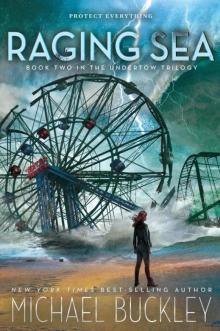 Raging Sea
Raging Sea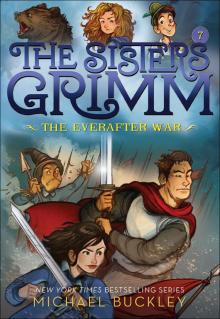 The Everafter War
The Everafter War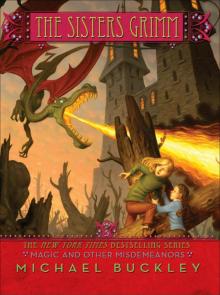 Magic and Other Misdemeanors
Magic and Other Misdemeanors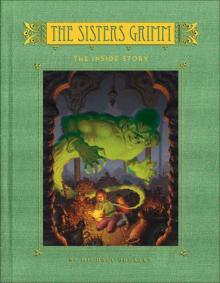 The Inside Story
The Inside Story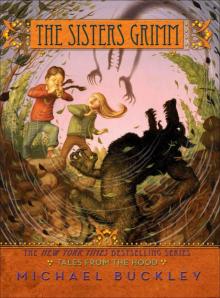 Tales From the Hood
Tales From the Hood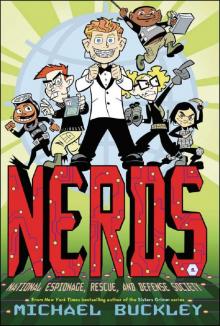 NERDS: National Espionage, Rescue, and Defense Society
NERDS: National Espionage, Rescue, and Defense Society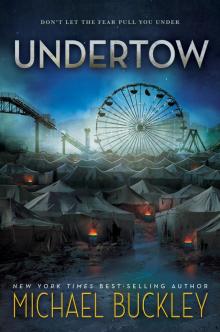 Undertow
Undertow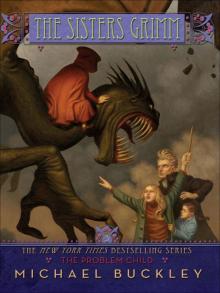 The Problem Child
The Problem Child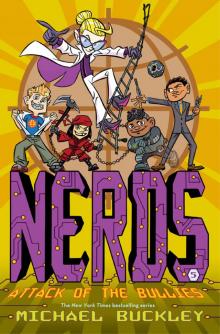 Attack of the BULLIES
Attack of the BULLIES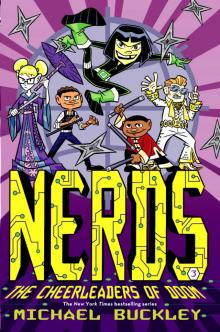 The Cheerleaders of Doom
The Cheerleaders of Doom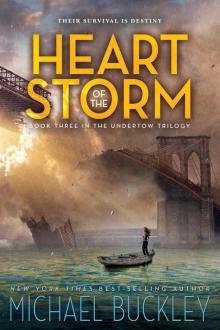 Heart of the Storm
Heart of the Storm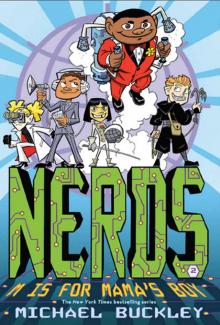 M Is for Mama's Boy
M Is for Mama's Boy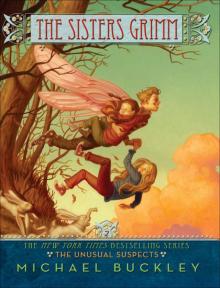 The Unusual Suspects
The Unusual Suspects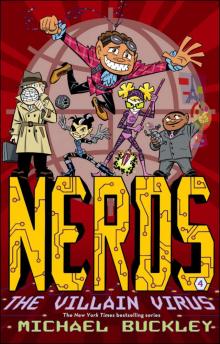 The Villain Virus
The Villain Virus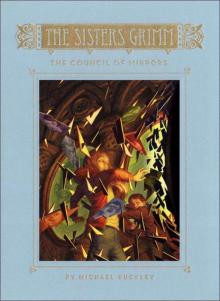 The Fairy-Tale Detectives
The Fairy-Tale Detectives The Unexpected Has Happened
The Unexpected Has Happened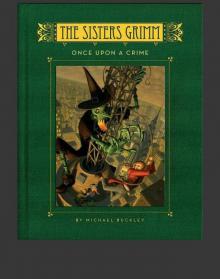 Once Upon a Crime (The Sisters Grimm, Book 4)
Once Upon a Crime (The Sisters Grimm, Book 4)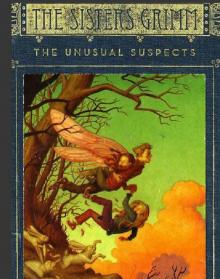 The Unusual Suspects (The Sisters Grimm, Book 2)
The Unusual Suspects (The Sisters Grimm, Book 2)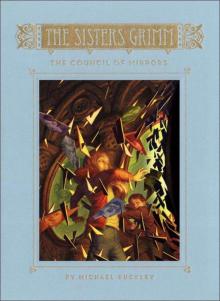 The Sisters Grimm: Book Nine: The Council of Mirrors (Sisters Grimm, The)
The Sisters Grimm: Book Nine: The Council of Mirrors (Sisters Grimm, The)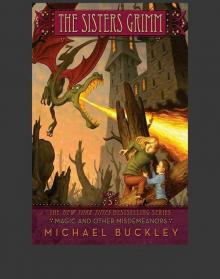 Magic and Other Misdemeanors (The Sisters Grimm, Book 5)
Magic and Other Misdemeanors (The Sisters Grimm, Book 5)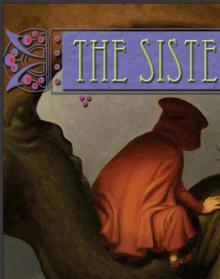 The Problem Child (The Sisters Grimm, Book 3)
The Problem Child (The Sisters Grimm, Book 3)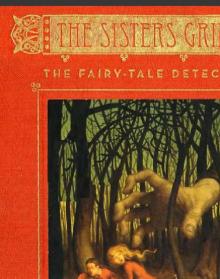 The Fairy-Tale Detectives (The Sisters Grimm, Book 1)
The Fairy-Tale Detectives (The Sisters Grimm, Book 1)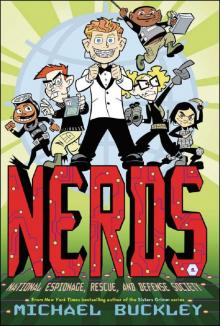 National Espionage, Rescue, and Defense Society
National Espionage, Rescue, and Defense Society